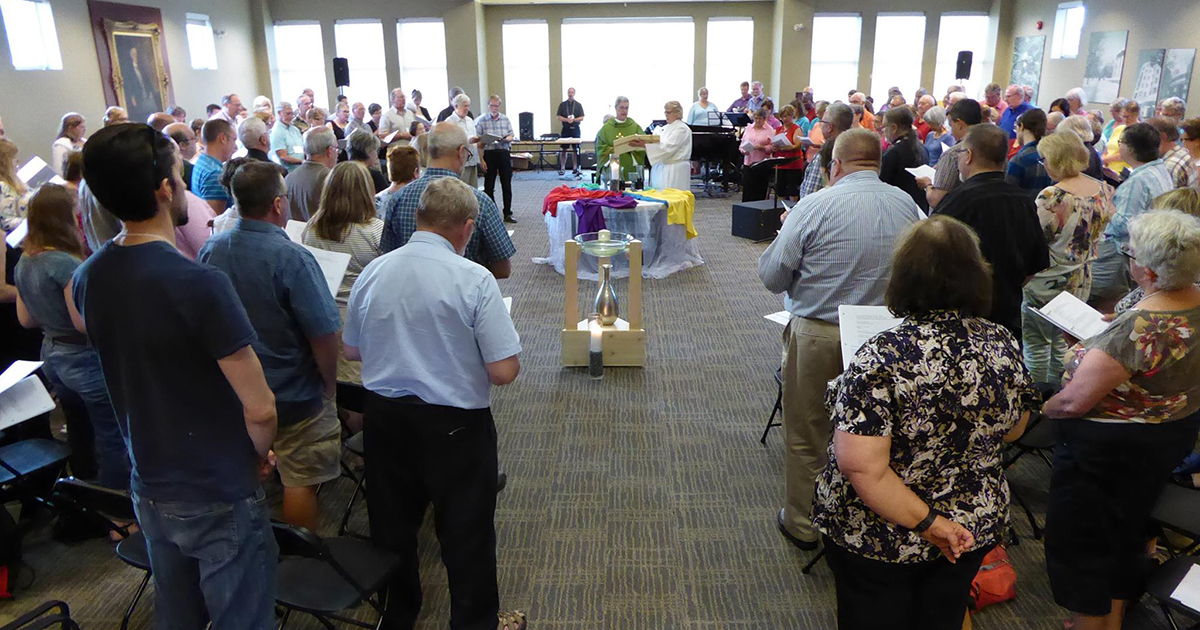One of the gifts of the full communion relationship between the Anglican Church of Canada (ACoC) and the Evangelical Lutheran Church in Canada (ELCIC) is the opportunity to share in each other’s liturgies. The relationship between worship and ministry was a major focus of the 2016 National Worship Conference (NWC), which took place from July 24-27 at Wilfrid Laurier University in Kitchener-Waterloo, Ont. In pooling their resources for worship together, Anglicans and Lutherans expanded their capacity to nurture a shared commitment to God’s mission in the world.
Approximately 135 people attended the conference, which brought together Anglican and Lutheran clergy and lay people from across Canada, the United States, and abroad.
The theme of this year’s conference was “Formation and Reformation: Worship, Justice, and God’s Mission”. The Rev. Tanya Ramer, Lutheran co-chair of the National Worship Conference Planning Team alongside Anglican co-chair the Rev. Canon Kevin George, explained that the word “Formation” had strong resonance in Anglican circles, while “Reformation” held significance for the Lutheran side.
“From our conversations around these two important foundation points, the words justice and God’s mission seemed to beg the invitation to join a worship conference, as they are all intertwined,” Ramer said.
“This also led us to the question which grounded all planning discussions, ‘How can worship be a response and catalyst to social justice issues and God’s mission in the world?’”
Keynote speakers
Two keynote speakers offered insights towards answering that question based on their own experiences.
The Rev. Dr. Stephen Larson, interim pastor at Trinity Evangelical Lutheran Church in New Hamburg, Ont., offered a Lutheran perspective. Participants praised his natural storytelling ability as he related personal encounters of justice and compassion to how ritual and liturgy can serve as a starting point for Christians to examine their role in the world.
In what Archbishop and Primate Fred Hiltz called “a very powerful image that I won’t forget for a long time,” Larson related the idea of a breadline, commonly associated with images from the Great Depression, to people lining up in the context of Christian worship—where, in the Primate’s words, “we are coming hungry for the bread of tomorrow and the wine of the age to come.”
The Very Rev. Bruce Jenneker, rector of All Saints Church, Durbanville in the City of Cape Town and canon liturgist for the Diocese of Saldnaha Bay in the Anglican Church of Southern Africa, provided an Anglican perspective. He discussed the meaning of liturgy in Christian tradition as a public work aimed at “the glorification of God and the divine sanctification of those who celebrate him.”
A major part of Jenneker’s address was the process of prayer book revision for the South African church, guided by the principle “Under southern skies in an African voice,” to create a specifically African prayer book.
Liturgy in a northern context, for example, often uses images of spring and renewal as part of Lent and Easter celebrations. In the southern hemisphere, however—where the Lenten season occurs in autumn—images of harvest are used instead to discuss the death and resurrection of Christ.
Worship, workshops, and music
Participants had the chance to take part in a variety of workshops, many of which explored the use of music in worship and the role of liturgy in building movements for justice.
Worship at the conference itself reflected similar themes. A highlight was an outside Eucharist held under the trees. The Rev. Canon Norm Casey, parish priest for the Anglican Parishes of the Six Nations, led the service along with other Indigenous clergy and lay leaders, with an elder ceremonially opening and closing the space.
National Indigenous Anglican Bishop Mark MacDonald called the conference “historic, in that it focused on issues of the church and Indigenous Peoples. It was expansive in bringing a new view on these issues to people working in all the related fields present”.
While ELCIC National Bishop Susan Johnson presided over the opening service and Bishop MacDonald preached, Archbishop Hiltz presided over the closing service. Bishop Linda Nicholls, coadjutor bishop of the Anglican Diocese of Huron that served as host diocese, offered a homily for the latter.
“The worship is always certainly a highlight, because of the musicians and the care that’s taken to plan and prepare the worship,” Bishop Nicholls said.
During the conference, participants recognized the contributions of two individuals for their significant contributions to the worship life of both churches, as the Rev. Dr. Paul Gibson and the Rev. André Lavergne became the Anglican and Lutheran recipients, respectively, of the 2016 Companion of the Worship Arts. Archbishop Hiltz and Bishop Johnson presented the awards.
‘Being the church in and for the world’
For Archbishop Hiltz, the conference underlined the shared importance of liturgy for both the ACoC and the ELCIC, and their common commitment to “being the church in and for the world”.
“I think this particular national worship conference really did nurture our continuing life together,” he said.
From a Lutheran standpoint, Ramer echoed the Primate’s sentiments.
“I think both of our churches are churches that have a message of abundance to share with the world,” she said. “And I don’t necessarily mean abundant of financial wealth, but an abundance of the good news the world is craving.
“When we come together to share ministry, we become a richer church, because we model for the world that even though there are differences, the gifts in which we share unite us in works of justice and love for the world.”
Interested in keeping up-to-date on news, opinion, events and resources from the Anglican Church of Canada? Sign up for our email alerts .

